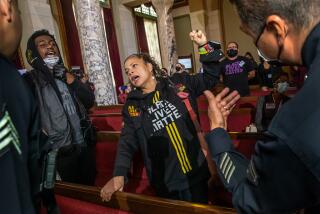LAPD Violated Blake’s Rights, Judge Says
- Share via
Los Angeles police violated Robert Blake’s constitutional rights when they allowed an author into the actor’s Studio City home during a police search the day after Blake’s wife was fatally shot, a judge ruled Tuesday.
The judge, however, denied a motion by Blake’s lawyer to throw out all evidence seized during the search, including a pistol, ammunition, personal papers and 51 nude photographs of his 44-year-old wife, Bonny Lee Bakley.
Los Angeles County Superior Court Judge Darlene Schempp ruled the evidence could not be excluded from Blake’s upcoming murder trial because author Miles Corwin was “merely an observer.” Corwin testified earlier that he did not touch anything at the scene.
Corwin spent a year with detectives from the Los Angeles Police Department’s Robbery-Homicide Division for his book, “Homicide Special: A Year With the LAPD’s Elite Detective Unit.” It features six cases, including the Bakley killing.
Schempp said that although Corwin’s presence violated Blake’s rights against illegal government searches and seizures, sanctions were not warranted because Corwin, a former Los Angeles Times reporter, “did not assist in the recovery of any of the evidence.”
The jurist also found there was “no unlawful behavior on the part of the police,” and said Blake’s then-defense lawyer also was present during the search and could have objected to Corwin’s presence at that time. Two prosecutors also were present.
Blake’s lawyer, M. Gerald Schwartzbach, argued in court for sanctions against the prosecution. But prosecutor Shellie Samuels said there was no evidence that Corwin’s presence expanded the scope of the search, a finding that would have allowed the judge to punish prosecutors.
The judge said she would consider later in the proceedings a defense request to inform jurors of the police breach.
Outside court, Schwartzbach said he was not surprised by the outcome because evidence can only be suppressed if a reporter actively participates in the search.
“When I am trying to protect Mr. Blake’s constitutional rights, I am trying to protect all of our constitutional rights,” the lawyer said. “To me, that is a threat to the privacy of every person.”
Schwartzbach said none of the evidence he was seeking to exclude incriminates Blake. There is no physical evidence linking the former “Baretta” television star to the May 4, 2001, shooting death of his wife near a Studio City restaurant where they had dined, he said. Blake, 71, has pleaded not guilty to the charges. He is free on a $1.5-million bond and faces life in prison if convicted.
Last week, Schempp ordered Corwin to take the witness stand to testify about his presence when police searched Blake’s home for evidence in the investigation. She ruled that Corwin had waived his rights under the state’s shield law for reporters when he signed an agreement with police that stated “his work product may be subject to subpoena and production in either criminal and/or civil litigation” and acknowledged that a court may determine that “by his involvement in homicide investigations, [he] becomes an ‘agent’ of the Police Department.”
Corwin’s attorney, Al Wickers, contended his client never waived his rights.
On the witness stand Tuesday, Corwin was unable to recall many details of the search. He said he destroyed his notes from the scene, as is his practice, after completing the book. Corwin also testified that he was never alone in the house nor did he touch anything. He said he stood for several hours as he observed the police.
Sandi Gibbons, a spokeswoman for the district attorney’s office, said her office did not authorize Corwin’s presence at the LAPD search.
More to Read
Sign up for Essential California
The most important California stories and recommendations in your inbox every morning.
You may occasionally receive promotional content from the Los Angeles Times.













